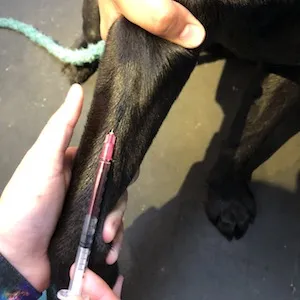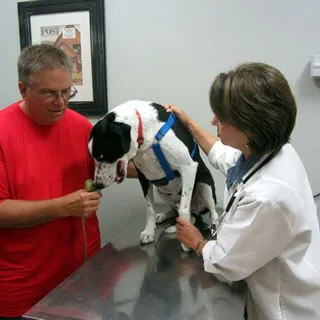Heartworm disease is a grave and potentially fatal condition that impacts countless dogs across the globe, including those in the United States. Caused by foot-long parasitic worms (heartworms) that reside in the heart, lungs, and associated blood vessels, this disease can lead to severe lung damage, heart failure, and compromise other vital organs. While heartworms primarily affect dogs, cats, and ferrets, they can also infest other mammal species like wolves, coyotes, foxes, and, in rare cases, humans. Given the proximity of wild carriers like foxes and coyotes to urban environments, they are significant contributors to the disease’s spread. Understanding the Symptoms Of Heartworm Disease In A Dog is crucial for early detection and successful treatment.
Dogs are natural hosts for heartworms, meaning that within a dog’s body, heartworms can mature into adults, mate, and reproduce. If left untreated, the number of worms can escalate dramatically, with some dogs harboring hundreds of these parasites. Heartworm disease inflicts lasting damage on the heart, lungs, and arteries, significantly impacting a dog’s health and quality of life long after the parasites are gone. This underscores the paramount importance of prevention, and when treatment becomes necessary, it should be administered as early in the disease’s progression as possible to improve outcomes.
It’s important to distinguish heartworm disease in dogs from that in cats. Cats are considered atypical hosts, and most worms in felines do not reach the adult stage. While cats with adult heartworms typically have only one to three worms, and many affected cats have no adult worms at all, this often leads to undiagnosed cases. However, even immature worms can cause considerable harm, leading to a condition known as Heartworm Associated Respiratory Disease (HARD). Furthermore, the medications used to treat heartworm infections in dogs are not safe for cats, making prevention the sole means of protecting felines from heartworm’s debilitating effects. For comprehensive insights into canine health, consider understanding why do dogs get heartworm and not humans, which highlights the unique susceptibility of canines.
 Close-up image of long, white heartworms, illustrating the parasites that cause heartworm disease in a dog's heart and lungs
Close-up image of long, white heartworms, illustrating the parasites that cause heartworm disease in a dog's heart and lungs
The Lifecycle of Heartworm: How Transmission Occurs
The mosquito plays a vital role in the heartworm lifecycle. Adult female heartworms, living within an infected host such as a dog, fox, coyote, or wolf, produce microscopic offspring called microfilariae. These microfilariae circulate in the infected animal’s bloodstream. When a mosquito bites an infected animal and ingests blood, it also picks up these microfilariae. Over a period of 10 to 14 days, inside the mosquito, the microfilariae develop and mature into “infective stage” larvae.
Subsequently, when this infected mosquito bites another dog, cat, or susceptible wild animal, the infective larvae are deposited onto the surface of the animal’s skin. They then enter the new host through the mosquito’s bite wound. Once inside the new host, it takes approximately six months for these larvae to mature into adult heartworms. Adult heartworms can live for five to seven years in dogs and up to two or three years in cats. Due to the longevity of these parasites, each mosquito season can lead to an accumulating number of worms within an infected pet, exacerbating the disease’s severity.
Understanding the Symptoms of Heartworm Disease in Dogs
Recognizing the symptoms of heartworm disease in a dog is critical for timely intervention. In the early stages of infection, many dogs exhibit very few or even no noticeable symptoms. This is precisely why regular testing is so important, even for seemingly healthy dogs. As the infection progresses and the number of heartworms increases, clinical signs become more apparent. Active dogs, those with a heavy worm burden, or dogs with pre-existing health issues are often more likely to show pronounced clinical signs. The severity of symptoms can be categorized into early, moderate, and severe stages.
Early Stage Symptoms: Subtle Cues Pet Parents Might Miss
During the initial phase of heartworm disease, the symptoms are often non-specific and subtle, making diagnosis challenging without professional veterinary testing. These early indicators are generally associated with a low worm burden and minimal damage to the heart and lungs. Pet owners might observe:
- Mild Persistent Cough: A dry, hacking cough, especially after exercise or excitement, may be one of the earliest signs. This cough is often mistaken for other common respiratory issues, so it’s easily overlooked.
- Reluctance to Exercise: Dogs that were once eager for walks or playtime might start showing less enthusiasm. They may tire more quickly than usual during physical activity.
- Fatigue After Moderate Activity: Even short bursts of activity, like a brief fetch session, might leave your dog unusually winded or lethargic.
- Slight Decrease in Appetite: A subtle reduction in food intake might be noticed, although this can be quite variable and may not always be present.
These early symptoms of heartworm disease in a dog can easily be dismissed as normal aging or other minor ailments, highlighting the need for vigilance and routine veterinary check-ups.
Moderate Stage Symptoms: Progressive Signs of Disease
As the heartworm infection progresses and the worm burden grows, the damage to the heart, lungs, and blood vessels intensifies, leading to more pronounced and persistent symptoms. These signs indicate a more established disease state:
- More Frequent and Pronounced Coughing: The cough becomes more persistent and may sound wetter as fluid accumulates in the lungs.
- Noticeable Exercise Intolerance: The reluctance to exercise becomes more evident. Dogs may struggle with even short walks and spend more time resting.
- Increased Fatigue and Lethargy: Your dog will appear tired most of the time, lacking energy for daily activities.
- Decreased Appetite and Weight Loss: A more significant reduction in appetite becomes apparent, often leading to noticeable weight loss despite adequate food availability.
- Dull Coat: The dog’s coat may lose its luster and appear dull or unhealthy due to overall declining health.
At this stage, the disease is causing significant physiological stress, and the symptoms of heartworm disease in a dog are usually clear enough to prompt veterinary attention.
Severe Stage Symptoms: Life-Threatening Manifestations
In the advanced stages of heartworm disease, the damage to the cardiovascular and respiratory systems is severe and potentially irreversible. These symptoms indicate a critical condition and require immediate veterinary intervention:
- Heart Failure: Dogs may develop signs of congestive heart failure, characterized by a swollen belly due to the accumulation of excess fluid in the abdomen (ascites).
- Difficulty Breathing (Dyspnea): Labored breathing or shortness of breath, even at rest, is a critical sign.
- Caval Syndrome: This is a life-threatening form of cardiovascular collapse that occurs when a large number of heartworms block blood flow within the heart. Symptoms of caval syndrome include a sudden onset of extremely labored breathing, pale gums, and dark bloody or coffee-colored urine. Without immediate surgical removal of the heartworm blockage, very few dogs survive this acute condition.
- Cyanosis: A bluish tint to the gums or tongue, indicating a severe lack of oxygen.
- Collapse: Due to extreme cardiovascular compromise.
These severe symptoms of heartworm disease in a dog are a clear emergency and underscore the importance of preventative measures and early detection. For pet parents, understanding the subtle shifts in behavior and health can be key to early intervention, much like addressing other common canine issues, such as finding effective flea and ear mite treatment for dogs for other parasitic concerns.
Why Symptoms Vary: Factors Influencing Clinical Signs
The manifestation and severity of heartworm symptoms in dogs can vary significantly based on several factors:
- Worm Burden: The number of adult heartworms present in the dog’s body. A higher worm burden generally leads to more severe symptoms.
- Duration of Infection: The longer the infection persists, the more extensive the damage to the heart and lungs, and thus, more pronounced symptoms.
- Activity Level of the Dog: Highly active dogs tend to show symptoms earlier and more severely because their cardiovascular system is under greater strain.
- Individual Dog’s Response: Each dog’s immune system and overall health status can influence how they respond to the infection.
- Presence of Other Health Issues: Concurrent diseases can exacerbate heartworm symptoms or make diagnosis more complex.
Even dogs with a substantial number of heartworms may show few or no symptoms early in the disease progression, which is why annual testing is paramount, regardless of observed clinical signs.
Assessing Your Dog’s Risk for Heartworm Infection
Many factors contribute to a dog’s risk of heartworm infection, even if it might not seem like a prevalent issue in your immediate area. Heartworm disease can be more common than you realize, or you might inadvertently travel with your pet to regions where the disease is more widespread. Furthermore, heartworm disease is continually spreading to new geographical areas each year.
Stray and neglected dogs, along with certain wildlife species like coyotes, wolves, and foxes, act as carriers of heartworms, contributing to the environmental reservoir of the disease. Mosquitoes can be carried long distances by wind, and the relocation of infected pets to previously uninfected areas also facilitates the spread. A notable example was after Hurricane Katrina, when an estimated 250,000 pets, many of them heartworm-infected, were adopted and transported across the country, aiding in the disease’s dissemination.
The reality is that heartworm disease has been diagnosed in all 50 states of the U.S., making risk factors challenging to predict with certainty. Variables such as climate fluctuations, the specific mosquito species present, the availability of mosquito breeding sites, and the presence of infected animal reservoirs cause infection rates to vary dramatically from year to year, even within the same communities. Importantly, because infected mosquitoes can find their way indoors, both outdoor and indoor pets are at risk.
 Map illustrating the incidence of heartworm disease across the United States in 2019, highlighting areas of higher risk for dogs
Map illustrating the incidence of heartworm disease across the United States in 2019, highlighting areas of higher risk for dogs
For these compelling reasons, the American Heartworm Society advocates for the “think 12” recommendation: (1) get your pet tested every 12 months for heartworm, and (2) administer heartworm preventative medication 12 months a year. This consistent approach offers the best protection against this pervasive disease.
The Importance of Heartworm Testing: Early Detection is Key
Heartworm disease is a progressive condition, meaning it worsens over time if left untreated. The earlier the disease is detected, the greater the chances of a successful recovery for your pet. Since many of the early symptoms of heartworm disease in a dog are subtle or non-existent, relying solely on observable signs is insufficient. Detecting the presence of heartworms through a veterinarian-administered heartworm test is therefore paramount.
The test itself is relatively straightforward, requiring only a small blood sample from your pet. It works by detecting specific heartworm proteins (antigens) produced by adult female heartworms. Some veterinary hospitals have the capability to process heartworm tests on-site, providing rapid results, while others send samples to external diagnostic laboratories. In either case, results are typically obtained quickly. If your pet tests positive, your veterinarian may recommend further diagnostic tests to assess the severity of the infection and determine the best course of action.
When and How to Test Your Dog for Heartworm
Testing procedures and optimal timing for heartworm screening can differ slightly between dogs and cats, though the focus here is primarily on dogs.
Testing Guidelines for Dogs
All dogs should undergo annual heartworm infection testing, which can usually be incorporated into a routine preventive care visit with your veterinarian. Specific guidelines regarding testing frequency and timing include:
- Puppies under 7 months of age: These young dogs can generally start on heartworm prevention without an initial heartworm test. This is because it takes at least six months from the time of infection for a dog to test positive. However, puppies should be tested six months after their initial veterinary visit, again six months later, and then annually thereafter to confirm they remain heartworm-free.
- Adult dogs over 7 months of age and not previously on prevention: These dogs require a heartworm test prior to initiating any heartworm prevention regimen. Following the initial test, they should be retested six months later, then 12 months later, and annually thereafter to ensure continued protection.
- Lapses in prevention: If there has been a break in your dog’s prevention schedule (e.g., one or more late or missed doses), it is crucial to have your dog tested immediately. A follow-up test should be conducted six months later, and then annual testing should resume.
Annual testing is essential, even for dogs consistently on year-round heartworm prevention, to verify the effectiveness of the preventive program. While heartworm medications are highly effective, no medication is 100% foolproof. Missing even a single monthly dose, or administering it late, can leave your dog vulnerable. Dogs might also spit out or vomit a pill, or rub off a topical medication, without their owners realizing. Regular testing serves as a safety net, ensuring that if prevention fails for any reason, the infection is detected early, allowing for prompt and effective treatment.
 Veterinarian taking a blood sample from a dog's leg for heartworm testing and diagnosis
Veterinarian taking a blood sample from a dog's leg for heartworm testing and diagnosis
What Happens After a Positive Heartworm Diagnosis?
Receiving a positive heartworm diagnosis for your dog can be distressing, but the encouraging news is that the majority of infected dogs can be successfully treated. The primary objectives of treatment are to stabilize your dog’s condition if they are showing symptoms, then eliminate all adult and immature worms, while simultaneously minimizing potential side effects from the treatment itself.
Here’s a general overview of what you can expect if your dog tests positive for heartworms:
- Confirm the Diagnosis: Once an initial antigen test yields a positive result, the diagnosis should always be confirmed with an additional, often different, diagnostic test. This is crucial because heartworm treatment is both expensive and complex, and your veterinarian will want absolute certainty that treatment is necessary before proceeding.
- Restrict Exercise: This is a critical, and often challenging, requirement, especially for active dogs. However, your dog’s normal physical activities must be severely restricted as soon as the diagnosis is confirmed. Physical exertion significantly increases the rate at which heartworms cause damage to the heart and lungs. The more severe your dog’s symptoms, the more stringent the activity restriction needs to be.
- Stabilize Your Dog’s Disease: Before the actual heartworm treatment can begin, your dog’s overall condition may need to be stabilized through appropriate supportive therapy. In cases of severe heartworm disease, or if your dog has other serious underlying health conditions, this stabilization period can extend over several months.
- Administer Treatment: Once your veterinarian determines that your dog is stable and ready for heartworm treatment, they will recommend a specific treatment protocol, typically involving several steps. The American Heartworm Society provides comprehensive guidelines for developing these treatment plans. Dogs exhibiting no signs or only mild signs of heartworm disease, such as a cough or exercise intolerance, generally have a very high success rate with treatment. More severe disease can also be successfully treated, though the potential for complications is greater. It’s important to note that the severity of heartworm disease does not always correlate directly with the severity of symptoms; dogs with many worms may show few or no symptoms early in the disease.
- Test (and Prevent) for Success: Approximately six months after the completion of the heartworm treatment protocol, your veterinarian will perform another heartworm test to confirm that all heartworms have been eradicated. To prevent the possibility of your dog contracting heartworm disease again, it is imperative to administer heartworm prevention year-round for the remainder of their life. This sustained prevention is key to long-term health. When considering prevention, some treatments also address other parasites, similar to 2 in 1 flea and worm treatment for dogs, offering comprehensive protection.
 A dog resting comfortably in a veterinary recovery cage during heartworm treatment, emphasizing exercise restriction
A dog resting comfortably in a veterinary recovery cage during heartworm treatment, emphasizing exercise restriction
Preventing Heartworm Disease: Your Best Defense
Prevention is unequivocally the best strategy when it comes to heartworm disease. It is significantly safer, less costly, and less traumatic for your dog than undergoing treatment for an established infection.
How Do Monthly Heartworm Preventives Work?
Whether the preventive medication you choose is administered as an oral pill, a spot-on topical liquid, or an injectable form, all approved heartworm medications function by eliminating the immature (larval) stages of the heartworm parasite. This includes the infective heartworm larvae deposited by mosquitoes, as well as the subsequent larval stage that develops internally within the animal.
Unfortunately, in as little as 51 days, immature heartworm larvae can molt into an adult stage, which cannot be effectively eliminated by preventives. Because it is crucial that heartworms are eliminated before they reach this adult stage, it is extremely important that heartworm preventives are administered strictly on schedule (monthly for oral and topical products, and every six months for the injectable). Administering prevention late can allow immature larvae to mature into the adult stage, which is far more difficult to prevent or treat.
 A dog receiving a check-up from a veterinarian, symbolizing routine care and heartworm prevention discussions
A dog receiving a check-up from a veterinarian, symbolizing routine care and heartworm prevention discussions
When Do I Start My Dog on Heartworm Prevention?
The risk of puppies acquiring heartworm disease is comparable to that of adult pets. The American Heartworm Society recommends that puppies begin heartworm preventive medication as early as the product label permits, and no later than 8 weeks of age.
The dosage of heartworm medication is determined by body weight, not age. Puppies experience rapid growth during their first few months, and the rate of growth, particularly in dogs, varies widely among breeds. This means a young animal can gain enough weight to transition from one dosage range to the next within a matter of weeks. It’s advisable to consult your veterinarian for guidance on anticipating when a dosage change will be necessary. If your pet is on a monthly preventive, you might consider purchasing only one or two doses at a time if a dosage change is expected. (Note that a sustained-release injectable preventive is available for dogs 6 months of age or older). Furthermore, ensure your pet attends all scheduled well-puppy exams to stay current on all health issues, including heartworm protection. Always confirm you are administering the correct heartworm preventive dosage by having your pet weighed at every visit.
Do I Need a Prescription for My Pet’s Heartworm Preventive Medication? If So, Why?
Yes, a prescription is required for your pet’s heartworm preventive medication. The U.S. Food and Drug Administration (FDA) labeling on heartworm preventives explicitly states that the medication must be used by or on the order of a licensed veterinarian. This mandate means that heartworm preventives can only be acquired from your veterinarian or with a valid prescription through a pet pharmacy.
Prior to prescribing a heartworm preventive, veterinarians typically perform a heartworm test to ascertain that your pet does not already harbor adult heartworms. Administering preventives to an already infected dog can, in rare instances, lead to severe reactions that could be harmful or even fatal. It is generally not necessary to test very young puppies or kittens before starting preventives, as it takes approximately six months for heartworms to develop to adulthood. If the heartworm test is negative, prevention medication is then prescribed.
 A close-up of a veterinarian performing a physical examination on a dog to assess overall health before prescribing heartworm medication
A close-up of a veterinarian performing a physical examination on a dog to assess overall health before prescribing heartworm medication
Is There an Effective Natural Prevention for Heartworm?
Only heartworm prevention products that have undergone rigorous testing and have been proven effective and safe by the U.S. Food and Drug Administration (FDA) should be utilized. There are no scientifically proven or FDA-approved “natural” remedies that effectively prevent heartworm disease. Relying on unproven natural alternatives can leave your dog unprotected and at severe risk of contracting this serious illness.
Is There a Vaccine for Heartworm Disease?
Currently, there is no commercially available vaccine for the prevention of heartworm disease in either dogs or cats. While research scientists are actively exploring this possibility, prevention at present relies solely on the regular and appropriate use of preventive medications, which are prescribed by your veterinarian. These medications are available in various forms, including once-a-month chewables, once-a-month topical applications, and once or twice-a-year injections. You should discuss the best option for your pet with your veterinarian. Many of these preventive medications also offer the added benefit of preventing other common internal parasites.
Are Heartworms More Common in Certain Areas of the United States?
Heartworms have been identified in all 50 states; however, certain regions do present a higher risk of heartworm infection than others. High-risk areas often include large regions near the Atlantic and Gulf coasts, as well as along major river tributaries. Most states also contain localized “hot spots” where the heartworm infection rate is significantly higher compared to other areas within the same state. Factors contributing to the level of heartworm infection risk include climate (temperature, humidity), the specific species of mosquitoes prevalent in the area, the presence of suitable mosquito breeding grounds, and the existence of animal “reservoirs” (such as infected dogs, foxes, or coyotes) that can sustain the parasite’s lifecycle.
I Live in a Northern State. How Long Should My Dog Be on Heartworm Prevention?
For a variety of reasons, the American Heartworm Society now recommends a year-round prevention program, even in regions of the country where winters are typically cold. Heartworms have been diagnosed in nearly every county in states like Minnesota, and there are variations in the duration of the mosquito season between the northern and southern parts of such states. Moreover, mosquito species are continually adapting to cold climates, and some species are capable of successfully overwintering indoors. Year-round prevention offers the safest and most comprehensive protection and is therefore strongly recommended. It’s also important to remember that many heartworm prevention products simultaneously de-worm your pet for intestinal parasites, which can pose significant health risks not only to your dog but potentially to humans as well.
What Causes a Dog to Die from Heartworm Disease?
Heartworm disease is a highly complex condition that can profoundly affect numerous vital organs, including the heart, lungs, kidneys, and liver. Consequently, the outcome of infection can vary greatly among individual patients. The presence of adult worms triggers significant inflammation within the blood vessels and can physically obstruct blood flow, leading to pulmonary thrombosis (blood clots in the lungs) and ultimately, heart failure. These parasites are “foot-long” worms, and the physical damage they inflict can be severe and extensive. Heartworm disease can also precipitate liver or kidney failure as a secondary complication.
Dogs exposed to a large number of infective larvae simultaneously face a substantial risk of sudden death due to the massive influx of developing larvae overwhelming the vascular system. Conversely, some animals may live for an extended period with only a few adult heartworms, exhibiting no clinical signs unless they encounter an environmental stressor, such as an extreme increase in temperature, or develop another significant health problem. The insidious nature of the disease, coupled with the potential for sudden, severe complications, underscores why understanding the symptoms of heartworm disease in a dog and proactive prevention are so critical.
 Illustration of severe heartworm infestation within a dog's heart, demonstrating the physical damage caused by the parasites
Illustration of severe heartworm infestation within a dog's heart, demonstrating the physical damage caused by the parasites
The Expiration Date on My Pet’s Heartworm Medication Is Past. Can I Still Use the Medication?
As with all drugs or pharmaceutical products, heartworm preventives should always be used before the expiration date indicated on the package. It is impossible to predict whether an expired medication will remain effective or safe. The expiration date is established through a series of rigorous tests mandated by the U.S. Food and Drug Administration (FDA) to provide assurance that the product retains its efficacy and has not undergone any significant deterioration over time. Using expired medication carries the risk that it may not provide adequate protection, leaving your dog vulnerable to heartworm infection.
I Have Missed 2 Months of Heartworm Prevention for My Dog. What Should I Do?
If you have missed two months of heartworm prevention for your dog, you must consult your veterinarian immediately. It is crucial to restart your dog on monthly preventive medication without delay. Following this, your dog should be retested six months after the last missed dose. The reason for this retesting is that heartworms must be approximately seven months old before an infection can be reliably diagnosed through standard tests. This six-month window allows enough time for any potential infection to mature to a detectable stage. Your veterinarian will advise on the best course of action to ensure your dog’s safety and well-being. Additionally, if you’re concerned about other internal parasites, monitoring for worms in dog poop after heartworm medicine can provide further insights for your vet.
Conclusion
Heartworm disease is a pervasive and potentially devastating threat to our canine companions. Recognizing the subtle and progressive symptoms of heartworm disease in a dog is a vital first step for any responsible pet owner, but it should not be the only defense. Due to the silent nature of early infection, annual veterinary testing combined with consistent, year-round prevention is the most effective strategy to protect your dog. Prevention is not only simpler and more affordable than treatment, but it also spares your beloved pet from significant pain and long-term health complications. Consult your veterinarian regularly to discuss the best preventive regimen for your dog’s specific needs and local risk factors. Proactive care ensures a healthier, happier life for your furry family member, free from the shadow of heartworm disease.
